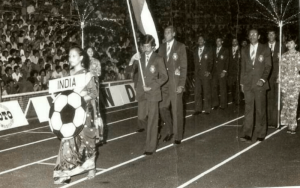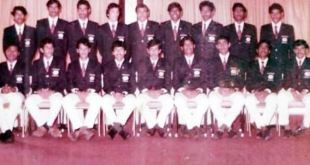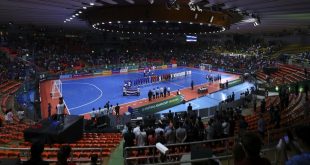 On the eve of the India versus UAE match in the Merdeka Cup on September 5, 1981, PK Banerjee looked at everyone’s face and paused for a moment before speaking up. “Can any of you tell me what the exact population of the UAE is?” he asked. There was a momentary silence in the room for a few seconds before a Kolkata-based footballer raised his hands. “Maybe around a crore,” he said hesitantly.
On the eve of the India versus UAE match in the Merdeka Cup on September 5, 1981, PK Banerjee looked at everyone’s face and paused for a moment before speaking up. “Can any of you tell me what the exact population of the UAE is?” he asked. There was a momentary silence in the room for a few seconds before a Kolkata-based footballer raised his hands. “Maybe around a crore,” he said hesitantly.
“You are more or less correct,” replied Banerjee, then the Head Coach of the Indian Men’s National Team. “Now tell me, what’s the population of India?” he asked again. This time, there was no shortage of raised hands in front of him. “More than 70 crores,” said at least three or four players together. Banerjee didn’t react to this.
Instead, he looked sharply at the 18 boys sitting in front of him. Then came his next question, which struck everyone in the room like a stinging bullet. “How do you look at the scenario when a nation of 70 crore people gets beaten by a team whose population is less than a crore? Does it enhance the prestige of a nation like India? How will all of you go back to India and justify to your mothers that you lost to a country whose population is less than any of the major cities in India?”
Banerjee’s comments had electrifying effects on the boys. The Blue Tigers were clearly charged up as they took the field against a strong United Arab Emirates team later that evening. They did wonders, to say the least. India ran away with a stunning 2-0 win.
Winger Harjinder Singh was one of the two goalscorers for India. Known as the “Man with a Golden Left Foot” during his playing days, Harjinder still remembers a few high points of the match and India’s remarkable journey in the 1981 Merdeka that ended in a semi-final defeat against a Brazilian side.
“The match against the strong UAE in the group league was a game-changer. No one expected us to win, but we beat them 2-0. I scored first, and then Xavier Pius struck the insurance goal. My goal was the result of a through pass. I placed it past the goalkeeper with a left-footer,” Harjinder told www.the-aiff.com from his Chandigarh residence.
“The 1981 Merdeka will remain etched in my memory forever. In the 4-3-3 system, I was assigned to play on the left by head coach PK Banerjee and I did a good job. I was adjudged the “Best Midfielder” of the tournament. Ironically, I learned about the award much later. We lost in the semi-finals and left for Pyongyang the same night to play a couple of matches against North Korea,” he added.
Harjinder Singh donned the Indian national team colours from 1974 to 1983, earning a reputation as one of the most skilled players among his contemporaries. During his playing years, spanning from 1974 to 1983, he participated in two Asian Games, was part of the 1974 Asian Youth Championship joint-winners team and proudly featured on the Asian All-Stars team.
Following his illustrious playing career, Harjinder embarked on a second innings as the coach of the Chandigarh Football Academy (CFA), contributing 22 years to nurturing talented footballers who later represented the nation across various age groups.
“Our performance in 1981 Merdeka was so good that we became heroes in the eyes of the local Indian fans. They showered us with gifts and dinner invitations. Five years prior to this, we didn’t play well in Merdeka, and some of these Indian fans pelted stones on the team bus. In 1981, the story was completely different,” Harjinder recalled.
“We drew 2-2 against hosts Malaysia to pave the way for a berth in the semi-finals. I scored both goals. I remember one of them vividly. I was near the six-yard box when the ball came to me. It was a soft pass. I controlled with my left and then chipped it over the goalkeeper’s head. He was completely stranded,” Harjinder, who is now the Head of Scouts in the AIFF, said.
India progressed to the semi-finals by securing victories against the UAE and Indonesia. However, their journey concluded with a 0-2 defeat against famed Brazilian club Sao Paulo in the semi-finals.
“In the semi-finals, we lost to Sao Paulo. They were certainly a better side, but there were other reasons behind the defeat. Throughout the tournament, it rained in Malaysia. The main pitch got increasingly muddy and controlling the ball required huge efforts. While we got tired, the Brazilians made the best use of their physical fitness, endurance and stronger bench strength. They were deserving winners,” Harjinder said.
When questioned about the factors contributing to the successful tournament, Harjinder remarked, “There were reasons behind our success in the 1981 Merdeka. We had a lot of players on the team, whose individual brilliance was never in question. Manoranjan Bhattacharya, Prasun Banerjee, Prasanta Banerjee, Xavier Pius, Narender Gurung, and Bishwajit Bhattacharya, all had skills and an unquestionable ability to play with the ball. It made the difference. On the other hand, we prepared well before the Merdeka with long camps. We could iron out the deficiencies.”
“Thereafter, we returned to India, and I was selected again to play in the King’s Cup in Thailand after a few weeks. I was sitting in the hotel lobby in Bangkok when the captain of the Singapore team came and congratulated me for being named the ‘Best Midfielder’ in Merdeka. I was surprised and told the coach. PK then made some inquiries and found it to be true,” he said.
Fast-forward to 2023, as India gears up to participate in the prestigious tournament after a hiatus of 22 years, Harjinder expresses confidence that this time too, the team will etch its name in history, stating, “The upcoming Merdeka will be a different ball game altogether. After all, football has changed a lot. But our boys should be able to hold the ball and not lose it in difficult situations. Merdeka has remained a traditional hunting ground for the Indians over the years. I am sure the boys will do well.”
 Arunava about Football A look at football & the world through my eyes!
Arunava about Football A look at football & the world through my eyes!



